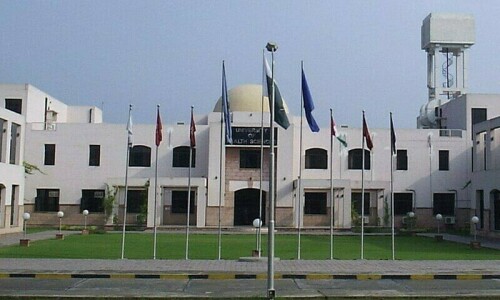Senior officials of the City District Government of Lahore (CDGL), its subordinate district wing of livestock and provincial livestock department look serious to review the Punjab Animals Slaughtering Control Act 1963. They sought recommendations for the purpose during a meeting held last week.
However, the steps are being taken after ‘50pc of the total consumption of meat in the city, until sometime back, consisted of unhygienic and dead animal meat’. Even these days, despite the action taken by the authorities, ‘25pc of the meat is unhygienic or of dead animals’.
One of the reasons of raise in this criminal activity which endangers public health beyond bounds is the relevant act which is not more than a joke in the name of the law.
Under the Punjab Animals Slaughtering Control Act 1963, anyone found involved in supply and sale of unhygienic meat is liable to be punished with imprisonment for a term which may be up to one month or with fine which shall not be less than Rs100 or with both.
Such a minor punishment for those playing with health of people is really a joke.
“This law is the main hurdle in eliminating such a heinous business. How we can stop it when the offence is bailable and the accused is freed by the court soon after the arrest,” the CDGL’s District Officer (Livestock) Dr Rahat Ali says. He says the officials, in a recent meeting held under the Lahore commissioner and the livestock secretary, focused on the issue, seeking recommendations from the quarters concerned for introducing necessary amendments to the law.
Dr Ali says the situation in Lahore regarding dead and infectious animals’ meat sale is really serious and it may have dangerous repercussions if this practice continues. At present, the city’s daily consumption of mutton and beef is about 10,000 goats and 1,000 to 1,200 cows/calves, adding that the department estimates consumption of chicken in the city is over 25 to 50 gram per person daily.
50pc of sold meat was unhygienic until recently; ratio is still 25pc
“The situation is so serious that the sale and slaughtering of dead/infectious animals rose over 50pc of the total meat consumption sometime ago and this included even sale of donkey meat,” he adds.
Dr Ali claims that though the officials have, so far, succeeded in bringing down the sale of unhygienic meat up to 25pc of the total consumption, the mafia still seems to be active in various parts that are considered to be dens of those involved in unlawful slaughtering.
“Kot Kamboh (Bakar Mandi, near Babu Sabu), Shahdara, Shalimar, Daroghawala and Chungi Amar Sadhu are the areas where the butchers have arrangements of purchasing, transporting and slaughtering of dead and infectious animals and supply of their meat across the city,” he says. A couple of days back, we raided a house in the Chungi Amar Sadhu area and seized a huge quantity of unhygienic meat, he explains.
Giving tips to the public on how to identify the unhygienic meat, Dr Ali says the buyers can do this on their own if they concentrate. If the meat appears to be extra red, it is sure to be of a deceased animal; if it appears whitish, it means water was pumped into the animal after slaughtering. If the meat is not so much red and has some minor blackish dots, it is fresh and of a healthy and slaughtered animal, he adds.
When asked about how to recognise donkey meat, he says donkey meat is usually different in size than other kinds of beef and it is in between the size of a goat and cow, besides it smells.
The official also sought public cooperation for elimination of the unhygienic meat, urging them to inform the officials by using the helpline (9211).
An campaign to ensure running of the public transport, especially auto rickshaws, on just petrol in the city has been launched by the Lahore Transport Company (LTC). As desired by the Oil and Gas Regulatory Authority (Ogra), the departments concerned, mainly the LTC, CDGL and the transport, have been asked to launch a crackdown on those using the liquefied petroleum gas (LPG) cylinders to run auto rickshaws and other modes of transport.
“Installing cylinders, filling the LPG through decanting process at hundreds of outlets is banned for being dangerous to the public lives and health. That’s why the move has been taken in the city,” says an LTC official. He says the LTC’s enforcement wing is removing over 20 to 30 cylinders from rickshaws and other vehicles on a daily basis.
Published in Dawn January 27th, 2015
On a mobile phone? Get the Dawn Mobile App: Apple Store | Google Play












































Dear visitor, the comments section is undergoing an overhaul and will return soon.